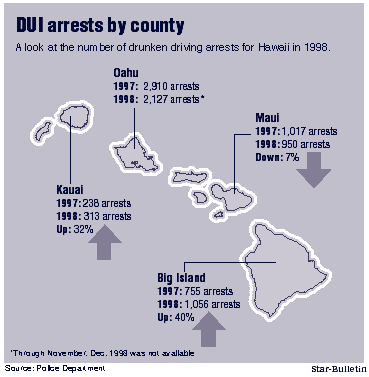

Alcohol-related traffic deaths at record low
With but 41 fatalities
By Jaymes K. Song
statewide, all counties but
Hawaii showed a decrease
Star-BulletinThe state had 41 alcohol-related traffic deaths in 1998, the lowest since such numbers were first recorded in 1982, according to preliminary figures released by police.
"It's incredible news," said Theresa Paulette, president of Mothers Against Drunk Driving of Hawaii. "It's so very, very encouraging. It shows we're doing something right. All of us. The whole community."

According to statistics from both MADD and county police departments:
Oahu had 22 alcohol-related traffic deaths in 1998, compared with 27 the year before.
Maui County, with three alcohol-related deaths, saw no change from 1997 to 1998. However, Maui declined in overall traffic deaths from 15 in 1997 to 13 last year.
Kauai had the biggest drop of all the islands, from 11 alcohol-related traffic deaths in 1997 to two last year.
After the 11 fatalities in 1997, the Kauai Police Department made drunken driving a top priority and stepped up enforcement, said Lt. Gordon Isoda of the department's traffic unit.
Kauai police made 32 percent more arrests last year (313) than the year before (238).
Overall traffic deaths on Kauai fell 79 percent from 14 in 1997 to three last year.
The Big Island had the only increase, with 14 alcohol-related traffic deaths in 1998, from 13 in 1997.
The Big Island also had a 40 percent rise in the number of drunken driving arrests in 1998. Last year, 1,056 arrests for driving under the influence were made, compared with 755 in 1997.
That's due to officers targeting drunken drivers, increased enforcement, more people calling 911 to report impaired drivers and more motorists on the roads, said Hawaii County Police traffic investigator Martin Ellazar.
Hawaii County Police reported a 47 percent increase in overall traffic deaths with 44 last year compared with 30 in 1997.
Last year was the first time the state's alcohol-related traffic deaths dropped below 50 since MADD began keeping track in 1982, when the number peaked at 99.
The previous low of 59 was recorded in both 1997 and 1994, according to statistics from MADD and from the National Highway Traffic Safety Administration.
(The 59 deaths in 1997 from MADD and NHTSA included five deaths on private roads, which local police departments do not record.)
"I think it's the most encouraging news we've heard," said Paulette of the record low."It just means so much. It means the community has control and we can stop the carnage."
On Oahu, the number of people killed in all vehicular accidents dropped by 17 percent, from 75 in 1997 to 62 last year.
Maj. Rafael Fajardo, of the Honolulu Police Department's Traffic Division, credited the decrease to better, safer cars, greater seatbelt use, improved medical care, more enforcement and greater public awareness.
Paulette, whose 15-year-old son Brian was struck and killed by a twice-convicted drunken driver, was pleased with the low numbers -- but not satisfied.
"This is incredible, but we can't rest here," she said. "Families still lost a loved one. Their hearts are breaking. We need to continue till we win the fight."

State taking
By Mike Yuen
steps to clear up
inconsistencies
in DUI laws
Star-BulletinIf motorists are discovered to be "alcohol-impaired" while driving, their licenses are immediately revoked.
But that's not the case if motorists are driving under the influence of drugs.
With boaters, they're considered to have committed an criminal offense if they are found to be intoxicated after drinking beer.
But that's not the case if the intoxicant is drugs.
Such inconsistencies in the state's statutes that deal with impaired driving must be cleared up, say state transportation officials.
They've drafted an omnibus bill to consolidate driving under the influence statutes. In their view, drunken motorists shouldn't be the only ones facing immediate license revocation, said department spokeswoman Marilyn Kali. Motorists who use drugs or combine drug and alcohol use should face the same penalty, she said. So, too, should boaters who use alcohol and drugs separately or who combine their use, she added.
What happened, she added, is that during the past 10 years or so, DUI laws were passed piecemeal.
"This is a chance to look at the whole, big picture," Kali said.
Gov. Ben Cayetano's impaired-driving task force, whose members include emergency room doctors, attorneys and police officers and representatives from Mothers Against Drunk Driving, assisted the Transportation Department's review of DUI statutes.
The DUI review also spun off two other proposals, Kali said. One is on roadblocks; the other, drugs.
Several years ago, the state Intermediate Court of Appeals found that police roadblock procedures exceeding minimum requirements must be "scrupulously" followed. Otherwise, vehicles stopped would be deemed to have been illegally seized. Now, the Transportation Department and the impaired-driving task force want the law clarified so that police roadblocks only need to meet statutory requirements.
Also, the state's drug-impaired-driving statutes limits the offense to certain drugs. What they're seeking, Kali said, is to expand that statutory definition of drugs so that DUI offenses apply to any drug -- legal or illegal, prescription or over the counter -- that impair a person's usual mental process or that undermines a person's ability to care for himself or herself.